

Landlords put on brave face as impact of Coronavirus outbreak begins to bite
The RLA undertook a survey of its members at the end of March 2020. This survey focused on the views across the Private Rented Sector (PRS) on the package of measures which support tenants and landlords.
The survey found:
- Landlords were concerned about the sustainability of their income streams. Many landlords rely on their rental income – in many cases to supplement inadequate pensions.
- Landlords are facing problems getting routine maintenance and safety checks on their properties completed. This is reducing the quality of offer in the sector and making landlords nervous about falling foul of regulations.
- In contrast to the perception of landlords, many are being sympathetic to tenant hardship and distress.
- Landlord assessment of the overall package of support for the PRS was broadly neutral to positive. There was however strong levels of support for individual elements of that package.
Coincidentally this was the final weekend before the RLA and NLA merged. In a few weeks a second survey will be undertaken which will encompass the entire NRLA membership.
Introduction
In March 2020 the RLA undertook a survey of landlords, letting agents and other actors who support or participate in the Private Rented Sector (PRS).
The survey looked at the early impact of Government interventions designed to support the PRS during the Covid-19 crisis. This support emerged through a series of announcements and policy actions. More detail on the specific interventions can be found here.
The guidance, support and legislation issued by Government essentially cover (i) Rent, mortgage payments and possession proceedings (ii) Court action and (iii) Property access and health & safety obligations.
Survey Responses
The survey marketing focused on members of the then-RLA using the same email methods as its State of the PRS reports. This was supplemented with social media promotion. The survey was opened on Friday March 27th and closed on Monday March 30th.
There were 2,767 responses to the survey. Of these 2,680 can be described as current landlords. Landlords who let more than one property numbered 2,165 (80.8% of landlords who completed the survey) and the remainder were landlords who let just the one property.
The “Other” categories include letting agents, former landlords and professionals who advise landlords. Note the question asked participants about what they themselves considered their primary engagement with the PRS as the groups are not mutually exclusive – for example a solicitor could also be a landlord. The sample is in line with the most recent quarterly surveys run by the RLA.
This post considers only the responses of current landlords. Over 96% of responses fall into this category, so it is highly unlikely inclusion of the other groups would affect the reporting or inferences below. Note that the first half of the survey, covering business concerns, views on government interventions and changes in expectations were only directed at landlords.
Landlord concerns
The graph below highlights the key concerns landlords have in respect of their landlord business and current tenants.
Responses were on a five-point Likert scale ranging from “No concerns at all” to “Severe” concerns. The responses below highlight the proportion of landlords who answered with one of the two highest levels of concern.
Graph 1: Landlords with "Moderate" or "Severe" concerns about their property business
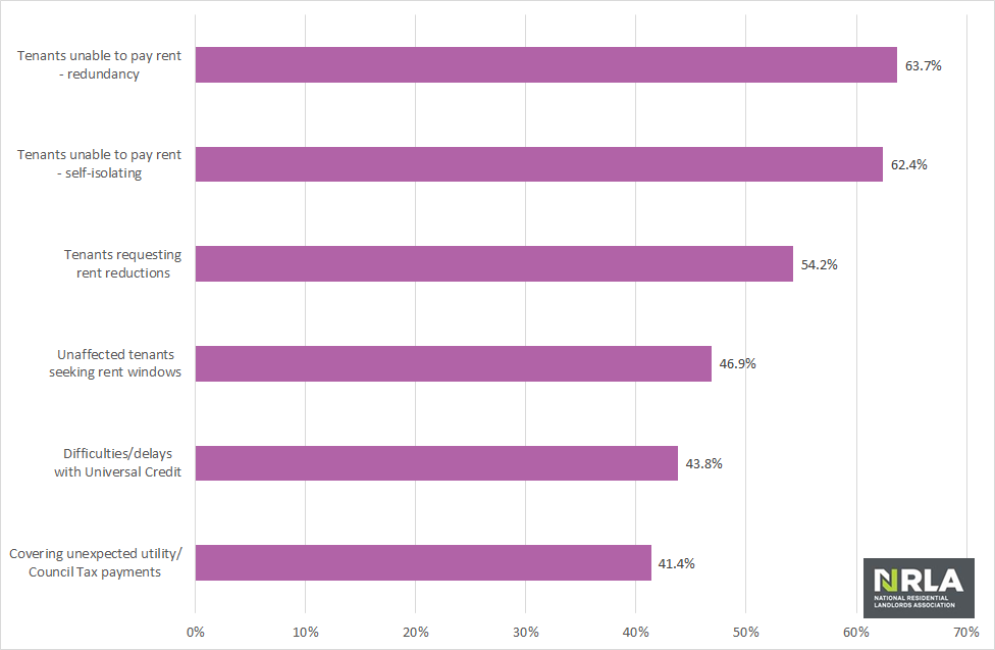
The above highlight the issues – drawn from a longer list – landlords are most worried about. These can be simply summarised as concerns over income sustainability and cash flow. Over half of landlords are concerned about tenant requests to reduce rents, with almost two-thirds worried about their tenant losing their job and being unable to pay rent.
Graph 2 shows current landlord concern over a selection of issues related to new tenancies.
Graph 2: Landlords with "Moderate" or "Severe" concerns on future tenancies
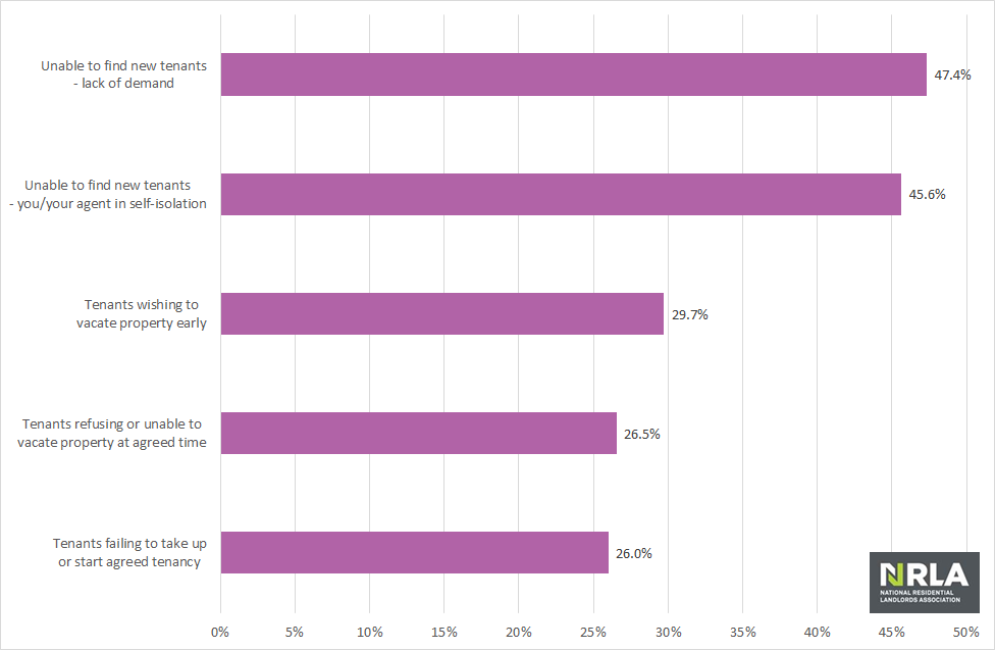
The key concerns landlords have focus on finding new tenants. They are concerned about both a lack of demand and the impact of the self-isolation landlords and agents can find themselves.
A smaller proportion of landlords are primarily concerned about either existing tenants vacating existing premises or signed-up tenants moving into a property as agreed.
Note that the second set of concerns set out in Graph 2 do not score as highly as the first set of results outlined in Graph 1. This emphisises the concerns landlords have with the sustainability of revenues from their property.
In a few weeks’ time this may look very different as tenancies expire and tenants reconsider their plans. This will be a measure of the success of the support package put in place by the Government and the resulting impact on the demand for tenancies – as well as the supply of hosuing to match that demand.
Difficulties in offering safe, secure properties
Through their requests to the RLA’s advice line, landlords have been reporting difficulties in keeping their properties maintained and safe. Landlords have been reporting to us that it was now becoming more difficult to get contractors on-site.
The survey attempted to gauge the extent of these difficulties across the PRS so landlords were asked how easy or difficult it was to maintain their properties. A five-point Likert scale was used.
Results are set out in Graph 3 below – the results are presented by comparing those who had found it “Difficult” or Very difficult” against those finding it “Easy” or “Very easy”.
Graph 3: Difficulties experienced with property maintenance
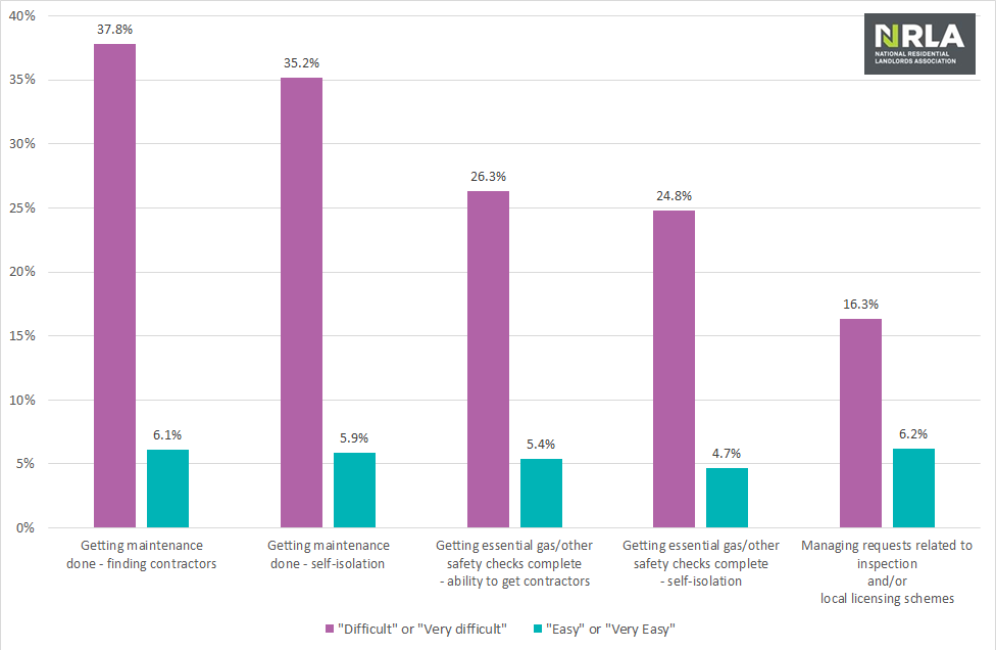
The results show over a third of landlords (37.8%) are already having difficulty finding contractors to undertake property maintenance work.
To add to landlord problems, a similar proportion (35.2%) had also experienced difficulties getting routine maintenance done because of self-isolation. Self-isolation (either landlords or tenants) was making access to property problematic.
Although fewer landlords (around a quarter of those who completed the survey) are presently experiencing difficulties with getting gas and safety checks complete, it is easy to envisage this issue rising up the agenda as more checks fall due.
The anecdotal comments landlords provided to support their responses underlines the problems which await landlords in the near future:
I am terrified I won’t be able to be ready for the new local selective licensing. I have two tenants who are vulnerable and must not have contact with anyone. I cannot get certificates
Gas safety certificate is due on one property, but the tenant is vulnerable to the virus and therefore will not let anyone into property. We have to respect his health and well-being.
[The] electrician wants me present. I would not go into tenant accommodation to do check whilst they are there as it is impossible to keep 2m distance
My regular handyman wants to wait until the risk goes before carrying out a small maintenance job at tenant’s property.
Suspension of court proceedings
Part of the package of interventions introduced by Government placed restrictions on a landlords’ ability to both issue notices seeking possession and to pursue breach-of-contract cases through the courts.
Landlords stated their concerns through a five-point Likert scale response. Graph 4 sets out the percentage of respondents who were either “Extremely” or “Moderately” concerned – the two highest levels of concern.
Graph 4: Landlord concern with policies aimed to protect tenants from eviction
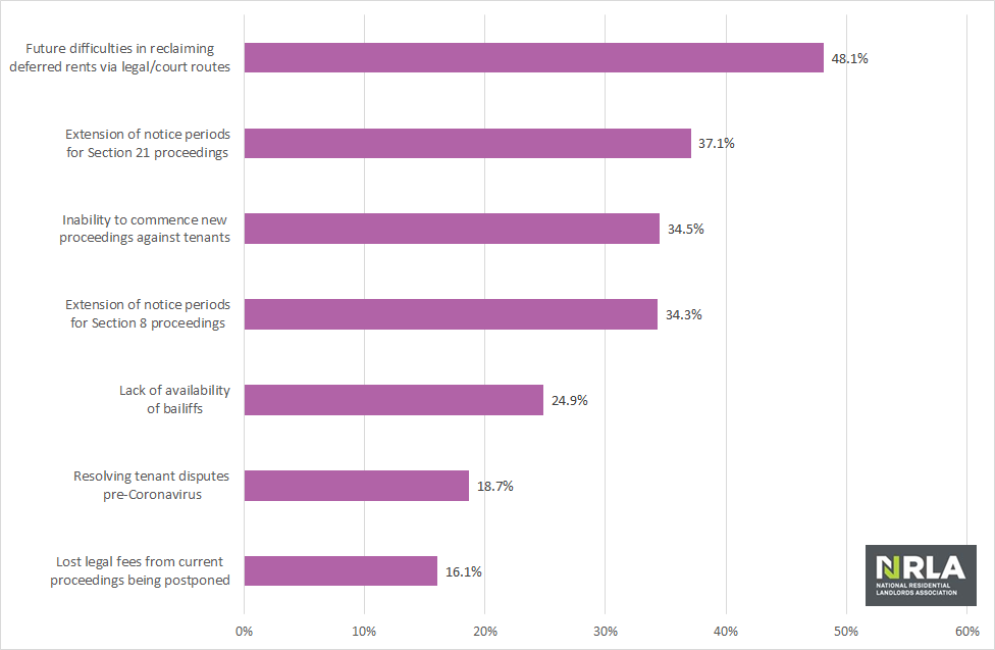
The key concern among landlords is clearly in the collection of rents deferred or reduced as a result of the current crisis. Almost half (48.1%) of landlords have some degree of concern about this issue.
In contrast only around a third of landlords were concerned about the various changes in court process. This is consistent with many previous RLA surveys which have highlighted the reluctant use of either Section 8 or Section 21 powers. The low scores are indicative of the much lower proportion of landlords who use these tools than is mistakenly assumed.
Comments from landlords included:
Our philosophy is to provide help where it is most needed. So we are prepared for some non-recoverable rent by the end to keep a tenant family afloat.
Shan’t be seeking to reclaim deferred rents. We share financial burden along with tenants and everybody.
A rent holiday doesn’t mean the tenant isn’t still obliged to pay what they owe at a later date. I suspect they don’t realise this and may not be able to cover any debt that accrues.
Overall view of Government interventions
We asked landlords to give their views on the Government’s overall approach to delivering support in the Private Rented Sector.
Landlords were asked to give an overall score of the Government’s approach. Following that, they were asked to judge individual elements of the approach. Responses were on a five-point Likert scale.
The results in the graph below show the “Net approval” – the simple difference between those who gave one of two positive responses and those who were more critical and gave one of the two negative responses.
Graph 5: Net approval for Government interventions which have an influence on the PRS
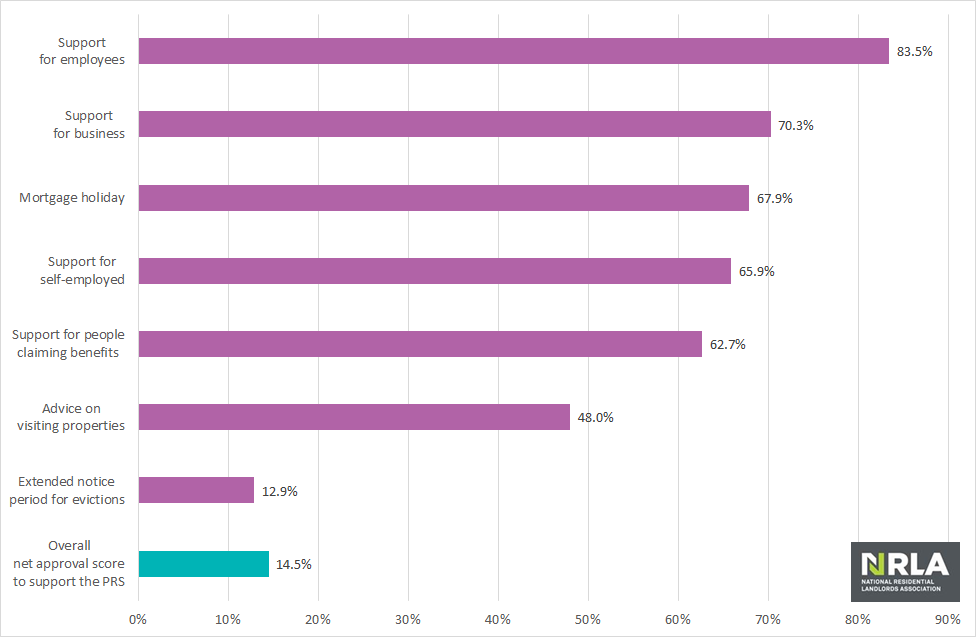
This graph is notable for one major reason: when landlords were asked to comment in the round on Government interventions and the impact on the PRS, then responses are mixed. The net approval score is positive but only just.
But support is much higher when asked to comment on the individual panoply of policies and support the Government are giving across the economy which also have an impact on the PRS.
The only exception to this is the extended notice on evictions. Even here however this element of the package is net positive – more landlords approve (at least to some extent) than actively disapprove.
Looking forward – landlord expectations
Survey respondents were asked to describe how they envisaged their future as a landlord. A series of statements about their business were presented to respondents and they selected the answer they felt was the most applicable to them.
The graph below shows the statements in full – along with the proportion of landlords who identified their main expectation of business prospects against each statement.
Graph 6: Landlords’ forecasts of future business prospects
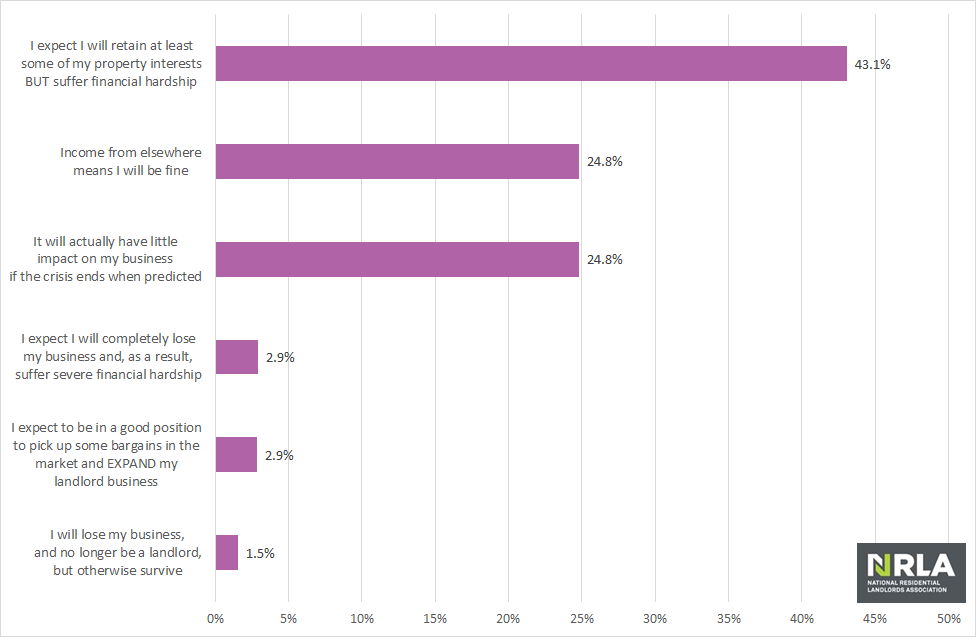
Over 40% (43.1%) of landlords are expecting a difficult trading period, with substantial consequences for them and their business. Only around a quarter of landlords expect to come through the current crisis relatively unscathed. An identical proportion will be relying on employment, savings or other income to economically survive.
For a small proportion of landlords – less than 5% – the expectation is that things will be getting very tough indeed. Again this proportion may change over time as the effects of government interventions begin to seep through into expectations and market-action.
In contrast to the image of landlords as cash-rich speculators and disaster capitalists, only a small number of landlords see coronavirus as a business opportunity. Fewer than 3% of landlords envisage portfolio expansion in the medium term.
Policy – the next steps
Landlords were asked to give their thoughts on what single, additional measure could be introduced by Government to reassure those who are in the Private Rented Sector (be they landlords, letting agents or tenants) at this moment? There were two policy suggestions which featured prominently:
Firstly, flexibility on Council Tax bills would be a highly popular move as any additional tenant churn will do nothing but add to the costs landlords face. For example, landlords will have to meet outstanding bills and standing charges which they would not usually face during normal times.
Secondly, a pause on the so-called “Tenant Tax”, otherwise known as the Section 24 amendment. In April 2020 landlord tax relief on mortgage interest payments will be completely phased out, replaced by a 20% tax credit. This change will have major implications for landlords and their tax affairs.
In the wake of coronavirus, reversing Section 24 was seen as providing a break for struggling landlords.
Comments from landlords included:
All [the interventions] are great but they have not actually done anything to help landlords, NOTHING.
A Lot of tenants think they do not need to pay rent for 3 months.
I am self-employed but unable to claim because my rental income and pension exceed my self-employed income. This will cause me severe financial hardship.
Actions don’t go far enough… the mortgage holiday just delays the pain; the self-employed support is not enough and too late.
Final comments
Landlords were asked to give their final thoughts on the current crisis and how it is affecting them. The below comments are typical:
Stressed, anxious, scared. Wanted to be independent and look after myself financially and some money to leave my children when I die. I thought rentals would be my future pension and security – but this virus has stopped this.
Just as we were hoping to enjoy running the business in retirement find the rug might be pulled from underneath us if this continues too long.
I fear that once again private landlords must face the brunt of the financial burden of tenancies.
[I] Feel media representation of landlords could have been more positive- we are trying to help our tenants but [we] are a small family run business.
Just as we were hoping to enjoy running the business in retirement find the rug might be pulled from underneath us.
Concluding comments
It barely needs saying that landlords are concerned about the future of their business in the wake of the coronavirus and the impact it is having on the economy.
The perception among landlords is that support for the PRS is focused on supporting tenants. There is net approval among landlords for many of the policies the Government has introduced.
However, landlords do seem to be one of those groups who have fallen between the cracks in policies which are well intentioned but have done little to allay the fears of landlords.
There are several key points:
Income sustainability
This is the main concern of landlords at present. While policy has been directed at supporting tenants and ensuring they remain in situ, there is little support for property owners. Many landlords rely on their property income. They also face a tax whammy with the final phase of the Section 24 amendment still scheduled for April.
Maintenance & safety checks
It is clear that those landlords who have required maintenance or a need to schedule safety checks face problems in getting this work arranged. Furthermore, with self-isolation, getting on-site is a further challenge. These challenges are especially problematic for those landlords with properties covered by licensing schemes. This is adding to landlord stress.
Some flexibility and common-sense is required before landlords begin to remove properties from the PRS for reasons of no-fault non-compliance. Landlords fear falling foul of laws which simply do not factor in the challenges of global pandemics.
Supportive landlords
Although landlords feel overwhelmed by the sudden challenge they face and the lack of support they perceive, they are supportive of the help being given elsewhere.
Again, the response of landlords reflects a reality which is very different from the mythology which surrounds those who let property. Whilst landlords are concerned about their own status, they are also keen to support tenants through these difficult times.
Landlords simply feel more could be done to reassure them about their savings, investments and business viability as they in turn seek to support their tenants.
Government messaging
For policy makers it is noteworthy that whilst landlords are broadly neutral towards “the package” of support, they are much more supportive of the individual components of that package. There may be lessons there for future policy, announcements and messaging.
Future work
Finally, these comments were collected at the end of March 2020, relatively early in the lockdown and economic support period. These issues will be revisited as this period extends.
